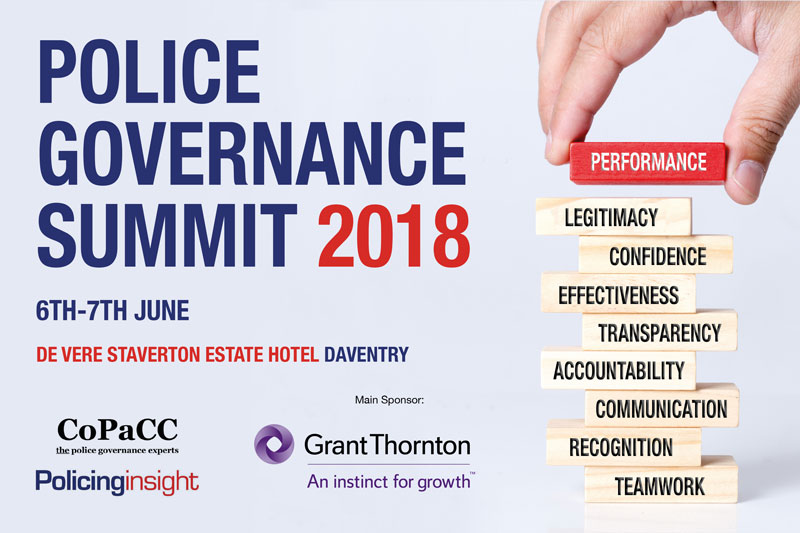It’s truly remarkable: since Police and Crime Commissioners were first elected in November 2012, there’s been no national conference focused on bringing policing governance professionals together. Well, that’s about to change. In early June this year, PCCs will mingle with Police and Crime Panel members; OPCC staff will rub shoulders with Panel support officers; police officers and policing-focused Professors will greet private sector suppliers supporting governance activities; and national policing agency leaders will stand alongside those working in relevant third sector and charity staff.
Well, you might say, much of that already happens locally, within individual force boundaries. To an extent, I’d agree. But here’s two key elements of what’s been missing, and how this Summit (and its counterparts in future years) can make a REAL DIFFERENCE…
DIFFERENCE ONE: Breaking the silos
There are two key “silos” that the Police Governance Summit 2018 will be aiming to break.
Firstly, the silo that exists between force areas. This is why it’s essential to have a NATIONAL policing governance conference, bringing together those with different views of policing – whether from the north or south; urban or rural, large force or small; “outstanding” or “requires improvement”; with a Conservative, Labour, Independent, LibDem or Plaid Cymru PCC or Panel Chair.
Secondly, the silos that exist between those with different (but complementary) perspectives on policing governance. These include the PCCs and their teams; Police and Crime Panels and their support staff; policing suppliers; police officers; those from the world of academia; third sector and the charitable sector; national policing bodies. These groups come together too infrequently, I believe. Each has a very valuable perspective to provide for others within the wider world of policing, to the greater societal good.
DIFFERENCE TWO: Ten topics that matter
The Summit programme has been designed by those it’s intended for – so the topics are absolutely ones that matter in police governance. Each session has panel members that have been very carefully chosen for their expertise and insight. In the two days, we’ll cover:
- Sensitive service areas and the Strategic Policing Requirement
- Using committees and the governance framework effectively
- Leadership of the OPCC
- Maximising the PCC – Police and Crime Panel relationship
- Practical collaboration and merger
- What works in holding the Chief Constable to account?
- Managing Chief Constable disciplinary and related considerations
- Learning lessons from police officer conduct
- Improving police ICT – and the implications for police governance
- The future of police governance.
The full agenda is available here.
DIFFERENCE THREE: Daring to disagree
“For good ideas and true innovation, you need human interaction, conflict, argument, debate”.
I wish that were my quote, but it’s not: it’s by Margaret Heffernan. If you’re not familiar with her work, Margaret is, amongst other things, the author of “Willful Blindness: Why we ignore the obvious at our peril”, “Women on Top” and “The Naked Truth: A working woman’s manifesto about business and what really matters”. She’s also delivered three TED Talks:
- “Dare to Disagree” (illustrated below – well worth 15 minutes of your time to view)
- “The Dangers of Willful Blindness”, and
- “Forget the Pecking Order at Work”
Margaret Heffernan talks vividly and memorably about “Constructive conflict”, and argues that “The people inside [organisations] are too afraid of conflict”.
The panels for this Summit are deliberately constructed of contributors that will not be afraid of candidly expressing their views, and – where appropriate – of respectful disagreement with fellow panel members.
Here, for example, is Paul Grady, Head of Policing for Summit Sponsors, Grant Thornton, talking about the Day One session that Grant Thornton will be leading, on “Using committees and the governance framework effectively”.
Realising the anticipated benefits from major police reform and transformation is fundamental to the viability of the sector, and audit committees have a key role to play in the assurance framework for this crucial area
Paul Grady, Grant Thornton UK
“Police audit committees face challenges in three broad areas: engaging with the wider organisation; gaining assurance over effective risk management; and ensuring they are an effective part of an integrated governance framework. In our view, the governance model for the police is less well defined than other areas of the public and private sectors. This includes the role of the audit committee, whose effectiveness can be impaired by a lack of engagement from the wider organisations they serve. “
“Some audit committees however, have found ways to make really useful contributions, and have particularly benefited when PCCs and chief constables have seen them as an ally to support them in their journey. But the scale of change ahead for the sector as a whole means the risk of major programme failure may increase if the level of governance oversight is not adequate. Realising the anticipated benefits from major police reform and transformation is fundamental to the viability of the sector, and audit committees have a key role to play in the assurance framework for this crucial area”.
So…
I’m keen to have Summit attendees that are ready to participate in “constructive conflict”, and themselves to challenge the views of each panel.
If you’re interested in listening to, or (even better) keen to participate in, the debates and discussions, do register now to attend
Make sure you’re able to say, “I was there”!
POLICE GOVERNANCE SUMMIT 2018
Preparing for the Challenges Ahead
Wednesday, 6th to Thursday, 7th June at the De Vere Staverton Park Hotel, Daventry
Booking now open – NEW conference only and single day booking options now available



